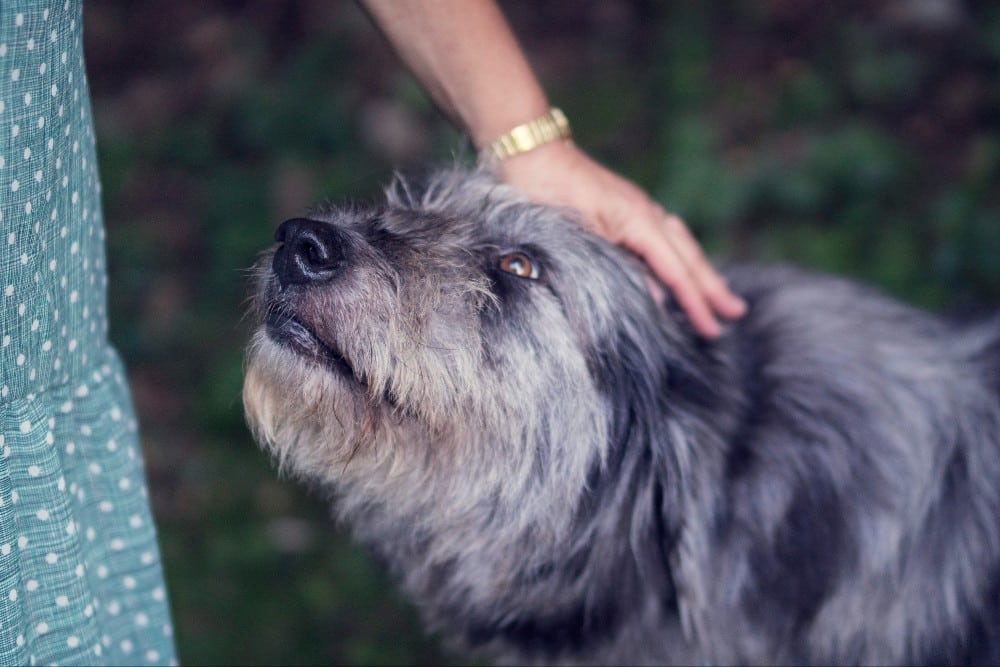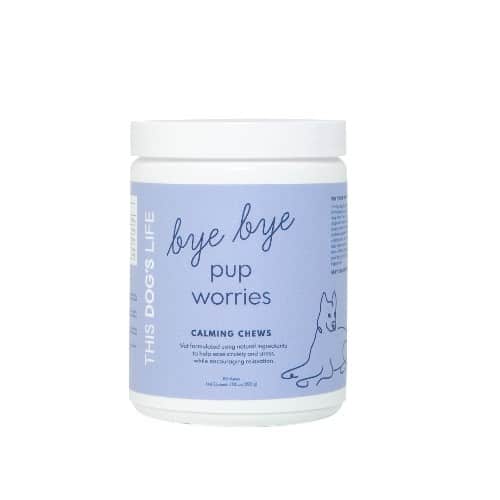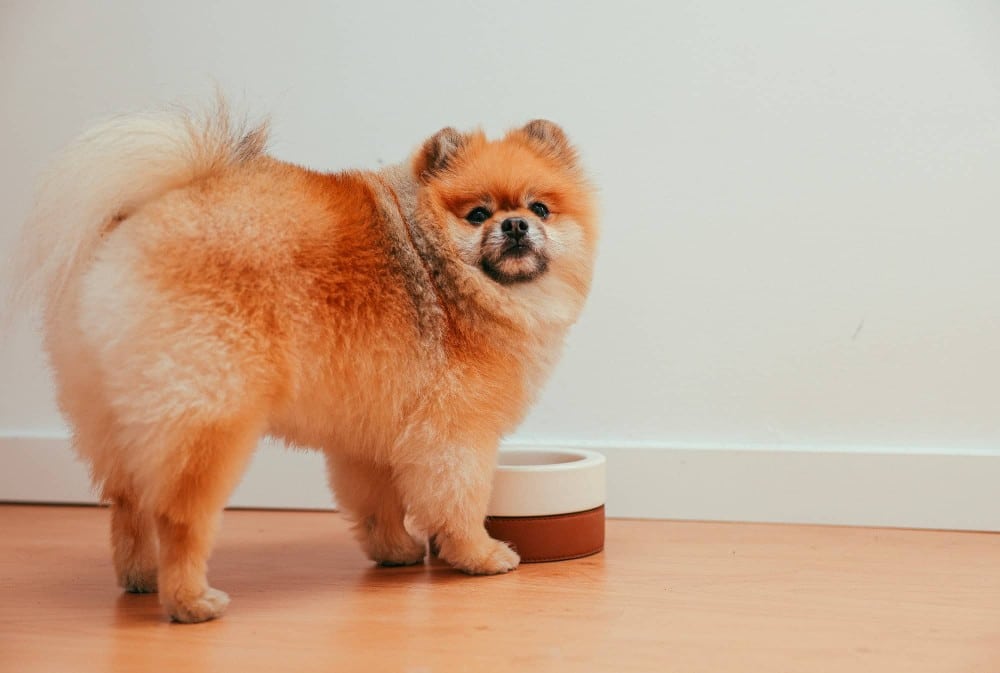Have you’ve noticed your older dog acting strangely? Is he keeping you up at night? Having accidents on your favorite rug? Is suddenly aggressive?
If you assume behavioral changes can be chalked up to old age, and there’s nothing you can do about it, you may be missing an opportunity to catch something medical in the early stages — after all, your dog can’t tell you what’s wrong. For instance, cognitive function, hearing, eyesight, and agility all decline as your dog ages, and these medical issues can impact your dog’s behavior.
For example if your older dog starts following you from room to room in a way that is noticeably different, it may be a sign of a cognitive problem like dementia, says Dr. Christopher Pachel, board-certified veterinary behaviorist and owner of the Animal Behavior Clinic in Portland, Oregon.
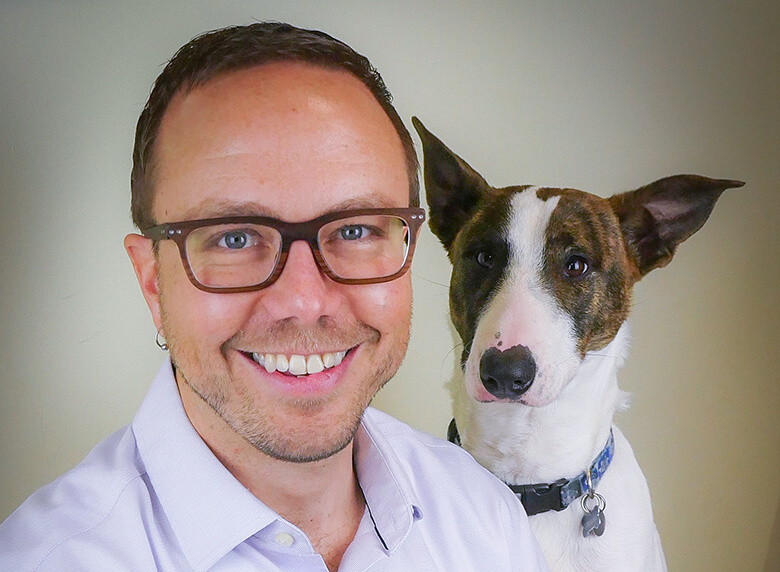
Or your dog may be seeking you out for comfort. “If the dog is experiencing any degree of pain or discomfort, they may be more likely to engage in actual attention-seeking behavior or may seek out proximity or interaction with the owner,” Dr. Pachel explains. “It’s a self-soothing sort of mechanism.”
Deciphering if changes in your senior dog are behavioral, medical, or a combo of both can be tricky. Below are some of the most common changes in senior dogs. As always, communicate with your vet often, especially as our besties get older, because just like humans, they may need a little bit more help as they age.
This post contains products independently chosen (and loved) by our editors and writers. This Dog’s Life may earn a small commission on qualifying purchases of the products we link to.
Confusion
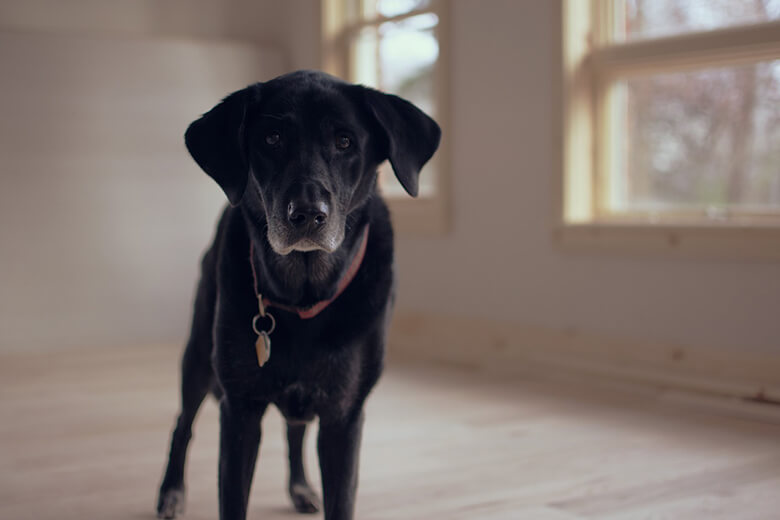
Does your dog start crying at night? Did you notice him facing the wrong way in an elevator? Or seemingly trapped behind furniture? Has he been having accidents in the house? Confusion is a common occurrence as dogs age.
Behavioral: Confusion in aging dogs can manifest as disorientation or difficulty in navigating familiar environments. This might be due to a decline in their sensory abilities, such as hearing or vision loss, which makes it harder for them to interpret their surroundings. It’s important to understand that these behavioral changes are a natural part of aging and require patience and adaptation from the owner.
A trainer or behaviorist may suggest the following to help with confusion:
- Maintain consistent routines: From feeding, walks, and bedtime, a schedule provides a sense of stability and predictability.
- Keep the environment familiar: Avoid rearranging furniture or altering the house’s layout to help your dog navigate more easily.
- Engage in gentle activity: Encourage gentle, age-appropriate play and exercise to keep their mind and body active.
One of the most common reasons for confusion and disorientation is Cognitive Dysfunction Syndrome, which is often called canine dementia, and is similar to Alzheimer’s disease in humans. CDS is marked by the accumulation of “beta-amyloid protein,” a substance harmful to the brain. Additionally, CDS involves diminished blood flow in the brain and malfunctioning neurons, which are vital for transmitting information in the brain and body. As a result, when neurons fail to operate properly, it hinders the brain’s capability to remember, process information, and control bodily actions.
Here are the primary signs of cognitive dysfunction syndrome:
- Confusion/disorientation: Getting lost in familiar places, facing the wall instead of the door, getting trapped behind furniture or objects, and not being able to navigate around them
- Responsiveness/social behavior: Less interest in people and other dogs, less interest in being petted, not greeting you when you come home, or, on the other end of the spectrum, needing constant contact, including following you around and being clingy
- Activity — increased or repetitive: Stares or fixates on an object, paces, licking family members or objects excessively, vocalizing more, eating more or eating their food faster
- Activity — decreased or apathetic: Explores less, decreased response to things going on around him, self-grooming decreased, eating less
- Sleep-wake cycle disturbances: Reversed day and night schedules, restless sleep or waking during the night, sleeping more during the day
- Learning and memory: House soiling, impaired ability to perform tasks, unable to recognize people or other pets, decreased response to known cues for obedience and tricks, inability to learn new tricks or tasks, uses body language less
If your vet determines that your dog has dementia or other cognitive issues, there are treatment plans that can help. Drugs like Anipryl (selegiline hydrochloride) is a MOA inhibitor, which may support neurons communicate better and increase dopamine levels.
Your vet might also suggest introducing additional antioxidants into your dog’s daily routine, including food and supplements like Senilife.
Oils containing medium-chain triglycerides, such as coconut oil, may boost brain cognition, as these fats are beneficial as they supply energy to the brain. Calming supplements may also help your dog relax.
Related: A Deaf 11-Year-Old Dog Who Lived on the Streets, Finally Finds a Place to Rest His Head
Separation Anxiety
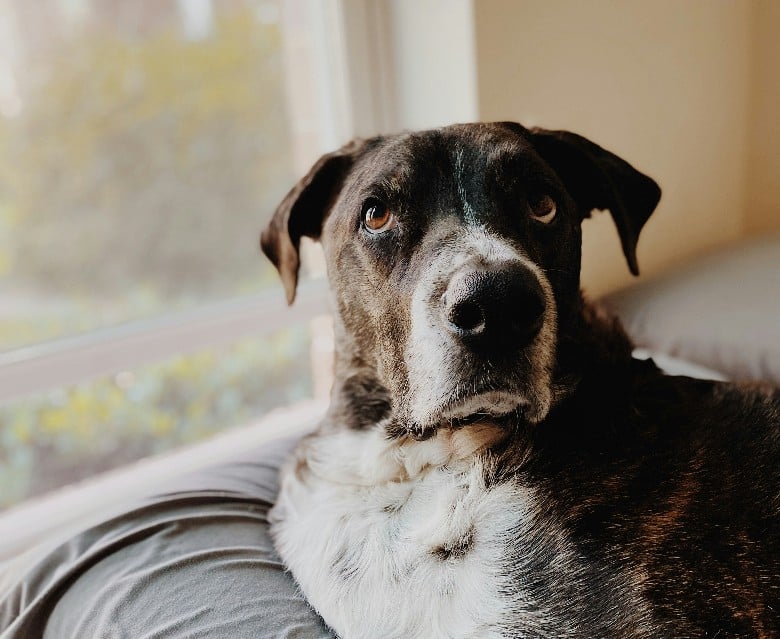
In a senior dog, separation anxiety may indicate more than nervousness about his main person leaving
Behavioral: Older dogs have a decreased ability to cope with changes. “A lot of dogs really seem to depend on routine for their own sense of security,” notes Dr. Pachel. They may exhibit behaviors that you may deem as destructive, such as chewing on things other than toys (e.g. shoes, cords, cushions), going through the trash, or peeing in the home despite being housebroken.
If behavioral, you can work with a trainer to help with separation anxiety. Some techniques they may teach, include:
- Stay unreactive: When leaving and returning home, don’t make a big deal out of it. Be calm, as excitement can reinforce their behavior.
- Focus on delayed gratification: Upon returning home, put off greeting your dog. Take your shoes off, put your coat away, change out of your work clothes, and then finally sell hello to your dog calmly.
- Set up a training routine: Get your dog used to you leaving … and then don’t. Put on your shoes and your jacket, grab your keys and your purse or wallet, get you phone, and then just stay. Get your dog used to your leaving routine, allowing him to control his emotions and nervousness. Other times, leave. It can be 30 seconds, 10 minutes, or an hour. By making the routine unpredictable, your dog will stop associating certain cues with leaving, which can trigger anxiety.
- Exercise your pup before you leave: This could be physical exercise, such as a sniffing walk, or mental, like an interactive puzzle or a Kong filled with peanut butter. The goal is to get some energy out before you leave.
- Hire a dog walker: If you plan on being gone for a long time, consider hiring a dog walker to break up the day, or have someone check in on your dog and give her some cuddles.
- Create a safe environment for your dog: There are differing opinions on crate-training, but providing a den-like space for your senior when you are gone can be comforting. You can choose to leave the crate door open or closed, and add something with your scent on it, like a t-shirt.
- Try calming supplements: These can work great for easing separation anxiety, according to studies. Based on research, these ingredients tend to work best for soothing a dog: valerian root, melatonin, lemon balm, l-theanine, chamomile.
Bye Bye Pup Worries use powerful natural ingredients like lemon balm and green tea to helps relieve nervousness, anxiety, and stress, so you can have a relaxed and happy pooch. All our supplements are proudly manufactured in the USA.
Aggression
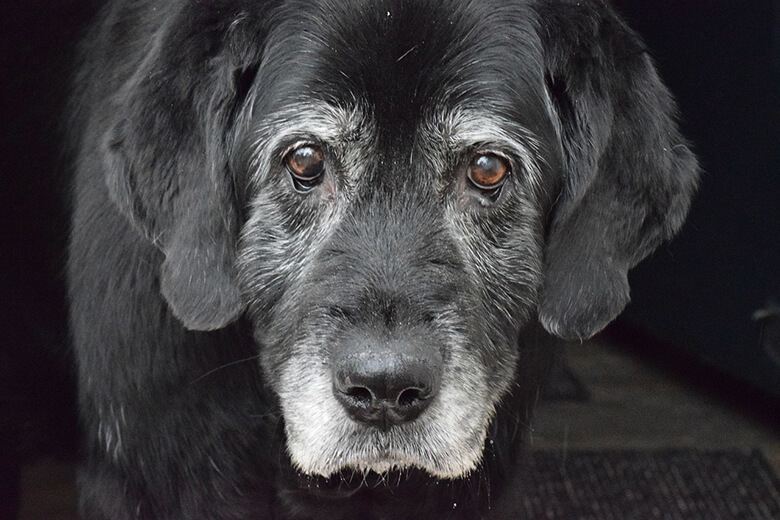
If a normally friendly older dog starts exhibiting unusual aggressive behavior, it’s important to figure out what’s going on, both for the dog and for the other dogs or people living with that dog. Aggression can be addressed by medical or behavioral intervention.
Behavioral: New stresses and changes may make a senior dog irritable or aggressive. Things like a new marriage or a divorce, a new baby or a new family member coming to live in the home, a death, or a new pet, all can be a factor in aggression in senior dogs. This may be attributed to the fact that a senior dog is weaker, less assertive or suffering from anxiety and sensitivity as she ages.
Consider working with a trainer to help your dog adjust to new situations. Some tips include:
- Identify aggression triggers: Observe and note what specific situations, noises, or actions trigger your dog’s aggressive behavior, to avoid or manage them effectively.
- Gradual desensitization: Slowly and carefully expose your dog to their triggers in a controlled manner, rewarding calm behavior to reduce their aggressive response over time.
- Increase socialization: Introduce your senior dog to new people, animals, and environments in a gentle and controlled way to build their confidence and reduce fear-based aggression.
- Use calming aids: Consider using pheromone diffusers, calming supplements, or anxiety-reducing garments to help soothe your dog’s nerves.
- Teach relaxation techniques: Train your dog with commands like “settle” or “relax” in a quiet spot to encourage calm behavior when they begin to show signs of aggression.
- Maintain a structured routine: Consistent daily routines can help reduce anxiety and uncertainty, which can be a factor in aggression.
- Honor your dog’s needs: For some senior dogs, new people, pets, and events are just really scary. If they need a breather from the “newness” going on in your household, provide them a quite place all their own.
Medical: Any condition that causes pain can result in aggression. This includes conditions like arthritis or dental disease. A loss of hearing or vision may cause a senior dog to become easily startled, and a loss of mobility makes it harder to get away from the source.
Bye Bye Doggy Aches chews are vet formulated and have more than 1,000 mg of powerful natural ingredients to help your pup deal with occasional discomfort. Glucosamine HCl, MSM, green-lipped mussels, and chondroitin support mobility and flexibility while also stimulating cartilage growth and maintaining joint lubrication. All our supplements are proudly manufactured in the USA.
If aggression is a medical issue, it is important to see your veterinarian right away to resolve it. They may run tests, scans, do procedures (like teeth cleaning or extractions), prescribe medication, including Gabapentin, and suggest daily supplements to address the ailment.
Related: Terminally-Ill Puppy Shakes Things Up at Senior Dog Home
Nocturnal Restlessness

Sleep patterns often change when dogs get older — seniors usually sleep more. They tire more easily from simple exercise such as daily walks. A change in sleep habits can also indicate medical issues as simple as the need for a middle of the night bathroom break — or something more serious.
Behavioral: Some senior dogs may not be able to sleep through the night. They may sleep more during the day, so they are up during the night, or may be more sensitive to outside noises that happen overnight and startle them. Figuring out what is triggering your senior may help you find a way to keep him calm overnight.
Medical: Signs such as crying, anxiety, pacing, whining or barking can indicate cognitive problems. Senior dogs may suddenly not know where they are. Dementia in dogs follows a “sundowner syndrome” like humans with Alzheimer’s disease. Fading light is a trigger, and symptoms get worse as it gets darker. Dementia, along with loss of sight and/or vision, causes anxiety in older dogs, which may interfere with sleep. Pain from joint disease can also be the cause.
Sleep patterns often change when dogs get older, as seniors usually sleep more. They tire more easily from simple exercise such as daily walks. A change in sleep habits can also indicate medical issues, including a common one: a decreased ability to hold their bladder, which require more bathroom breaks. Or it can be something much more serious.
Behavioral: Some senior dogs may not be able to sleep through the night. They may sleep more during the day, so they are up during the night, or may be more sensitive to outside noises that happen overnight and startle them. Figuring out what is triggering your senior may help you find a way to keep him calm overnight.
Behaviorists may suggest making these adjustments during bedtime:
- Get a night light: Dogs’ vision isn’t good to begin with, so adding a little light during the evening may help them feel more at ease.
- White noise machines: If they are becoming more easily started by unknown noises, consider getting a white noise machine for a consistent sound, or turning on music, such as classical, to soothe them to sleep.
- Giving them a calming supplement: As mentioned earlier, a calming supplement can help a dog relax and get a good night’s sleep.
- Have them close to you: If during your dog’s younger years, she slept in another room, it may be time to consider letting her be closer to you when it is time to go to bed. This pack-like approach can provide security.
Medical: Signs such as crying, anxiety, pacing, whining or barking can indicate cognitive problems. Senior dogs may suddenly not know where they are. Dogs with dementia may experience Sundowner Syndrome in which your dog becomes nervous, restless, and agitated at night. Fading light is a trigger, and symptoms get worse as it gets darker. Dementia, along with loss of sight and/or vision, causes anxiety in older dogs, which may interfere with sleep. Pain from joint disease can also be the cause.
Your vet may prescribe medication, supplements, or see if there is a holistic approach to elevating some of the stress.
Accidents in the House
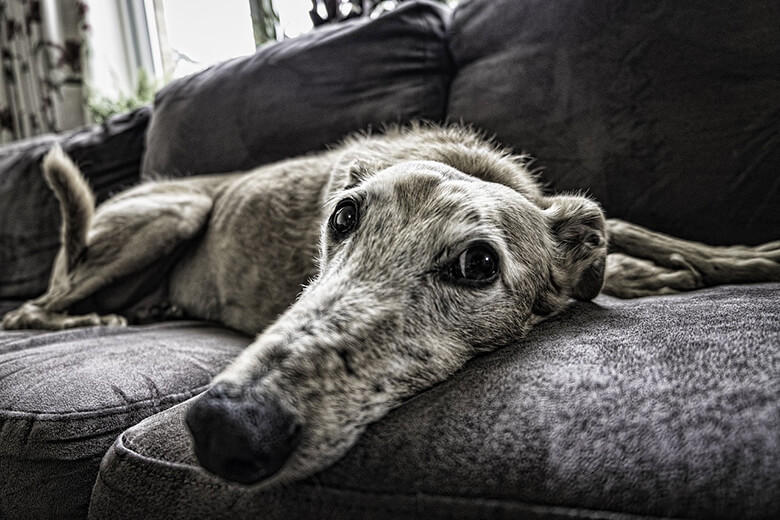
Senior pooches may start to have problems holding it during the day and night, or they forget where it’s appropriate to go (such as on a wee-wee pads) or how to ask to go outside. It’s not, however, because they’re “acting out,” as many assume, or they’re angry. Never punish a dog for an accident. If it’s behavioral, it will make the problem worse; if it’s medical, it will only make your dog fear you and increase anxiety.
Behavioral: Anxiety may be responsible for senior accidents. If older dogs are fearful about something in their environment, they may lose control. Or they may simply need an extra potty break.
Walking them right before bedtime may help, but you may have to plan for a quick middle of the night outing. Solutions also include diapers and belly bands. The answer, however, is not to lock your dog in a crate all night. He isn’t soiling out of spite and being crated won’t help him to hold it.
Medical: Causes include urinary tract infections, kidney disease, incontinence, diabetes, Cushing’s disease, colitis, inflammatory bowel disease, bladder stones, inflammation of the prostate, liver disease, medical conditions that cause pain and dementia. And dogs with cognitive issues may be unable to remember basic housetraining.
Other senior behavioral changes include increased vocalizations, noise phobias, changes in learned behavior, destructive behavior, and compulsive behavior. It’s vital to note when these behaviors occur to help your veterinarian or trainer get to the root of the problem and work on a solution.
And be patient. Senior dogs often get dumped at shelters because owners can’t handle these changes. They are at the highest risk for euthanasia in the overcrowded shelter system. Your canine grandma or grandpa has given you a lifetime of unconditional love. It’s time for you to give some back.
Related: Give Your Pup a Lift: Check Out the Best Dog Stairs and Dog Ramps
This article is for informational purposes only. It is not, nor is it intended to be, a substitute for professional medical advice, diagnosis, or treatment and should never be relied upon for specific medical advice.













